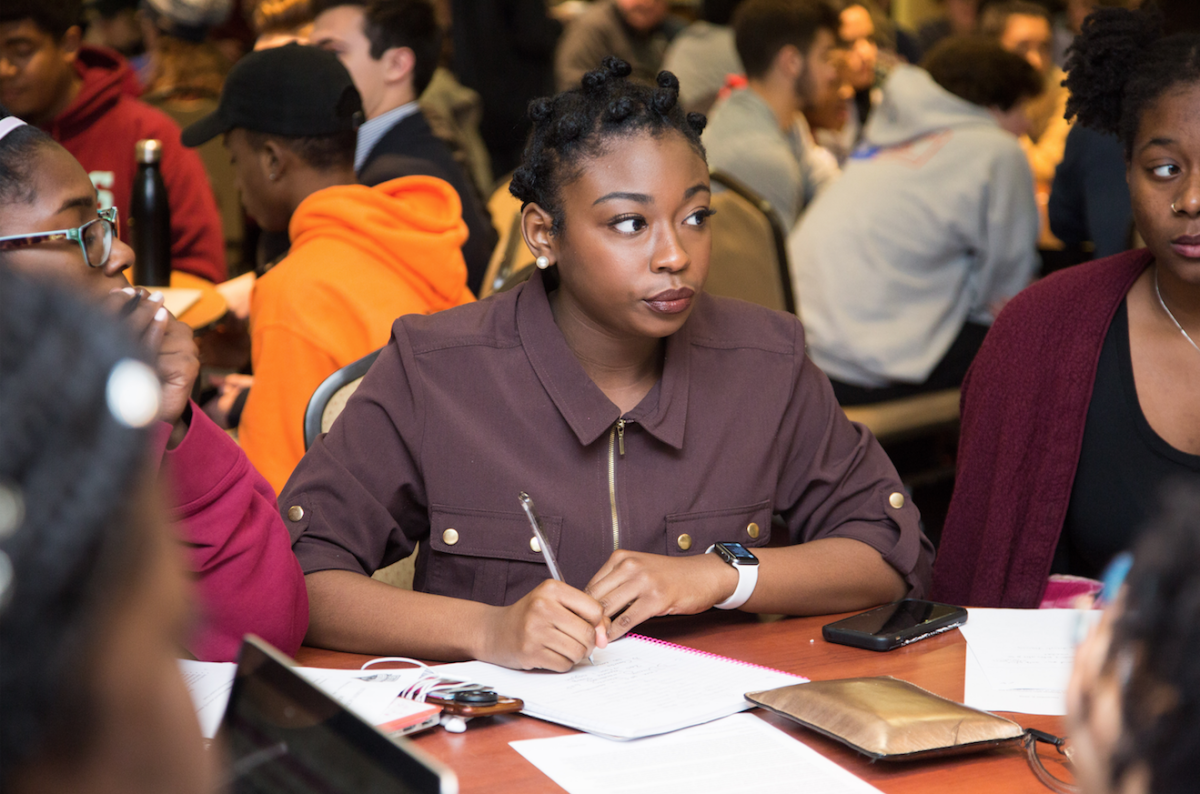At least 120 students, faculty and staff members attended a Dec.10 meeting of the University Student Senate (USS) and the Black Student Union (BSU) to generate ideas for a student action plan to address racism on campus.
The meeting, which took place in Campion Student Center, began with comments from USS President Jason D’Antonio ’19, followed by remarks from Camille Lodugnon ’22 and Alyvia Benson ’22. Lodugnon and Benson are the two black students whose door was vandalized with a racial slur, as reported in the Nov. 28 issue of The Hawk.
“It’s been a lot for us, but seeing your support, it really means a lot,” Benson said in her opening remarks. ”This is on everyone, as administrators, as students, as faculty. This is on everyone to point out when your peers say something wrong and you know that it’s wrong.”
Student Senator Kayla Michel ’20 told The Hawk that student government’s role is to push the administration to make change.
“We are all working to fix this problem and bring it to the administration,” Michel said. “We are the ones that are going to hold the administration accountable on behalf of the student body.”

Most of the meeting was spent in small group discussions, facilitated by questions prompting actionable steps from USS, potential future initiatives and what student leaders should ask of the administration.
Group discussions included the need for a zero-tolerance policy, diversity-focused trainings and conversations in freshman orientation and ways to engage students who are not interested in changing the racial climate on campus.
Michel said the conversation at her table focused on the need for clear policies involving racist acts committed on campus.
“People need to hold each other accountable,” Michel said. “That’s the first step. The second step is implementing policy that [is] very structured so there is no room for question.”
Jaulie Cantave ’22 said she attended the meeting to voice that point.
“I think that there needs to be a stronger policy in place for issues like this,” Cantave said. “I feel like there needs to be not just stronger policies but more regulation. There needs to be a better student and social environment for students of color.”
Student Senator Gabby Stevenson ’21 said she found the conversations at the meeting constructive.
“I was really eager to see how many students showed up because it is university issue,” Stevenson said. “It’s not a black, it’s not a white, it’s a university problem.”
Isis Gill-Reid ’20, a publicist for BSU, also said she thought the conversations went well.
“I think that people were able to highlight things that they would like to see put in action and things that would be feasible to accomplish,” Gill-Reid said.
In an interview with The Hawk following the meeting, D’Antonio said it’s what comes after these conversations, though, that is most important.
“What is really going to make a difference is action,” D’Antonio said. “I am looking forward to reading over what everyone said, and I’m looking forward to seeing the campus response to some of the recommendations we’re going to make to the university. I think one of the good things we’ll get out of this event tonight is we now have a written action plan. This is concrete, and we are going to hold ourselves to this as a student body.”

Jill Bodensteiner, director of Athletics, said she came to the meeting with the hope to use action steps developed in the meeting in her own department.
“I am really excited to hear this moving from conversation and dialogue to action,” Bodensteiner said, “and I think this is a really great first step for students to come together. I am here both to show support and also to hear some of the action steps.”
Lodugnon said she thought the meeting was productive and hopes what happened to her and Benson will not happen again.
“I really appreciate how Student Senate came together as well as BSU in making plans moving forward to have concrete policy so something like this would never happen again, or if it does, that there are clear punishments for people,” Lodugnon said.
Rebecca Roque ’20 and Ana Faguy ’19 contributed to this article.













































